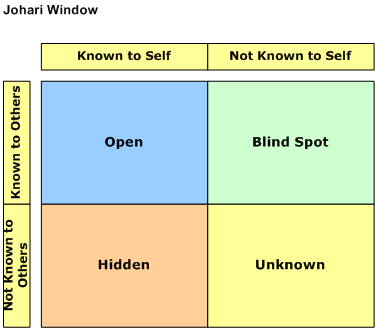
Feedback is a gift.
Everyone who has physical sight has a physical blind spot. Where your optic nerve exits the eye on its way to the brain, it creates an area on the retina without receptors that respond to light. Any image that falls in this region will not be seen.
Everyone also has a psychological blind spot—areas of your life that are apparent to everyone else but unseen by you.
The Johari Window (see graphic) is a simple four-pane grid that divides our self-awareness into four parts based on what other people know and don’t know about us and what we know and don’t know about ourselves.
To me, the most intriguing area is the unknown—those elements that are yet to be discovered. The most frightening area is the blind spot—areas of my life that are obvious to others but obscure to me.
Your blind spot (singular) encompasses multiple issues. Some of these issues are positive in nature—people may recognize strengths in you that you are unaware of. Some of the issues are negative—people see a flaw in your character or behavior that you don’t see. In this essay we’ll focus on the flaws because they are the hardest to uncover and acknowledge.
One of the greatest opportunities for self-improvement lies in discovering and disempowering these “unknown-to-self” flaws. It’s one of the most difficult things to do in life but the results are significant, even transformative. Here are some suggestions on how to become aware of your blind spot.
- Acknowledge that you have a blind spot filled with numerous defects. What do you think? Does the upper right-hand quadrant of the Johari Window apply to you? Please say yes.
- Desire to journey into this unknown and treacherous parcel of self.
- Find someone who is insightful enough to see clearly what you cannot see and who is willing to speak truth to you. Most people either don’t have the insight or don’t have the courage to do this. Find that rare person who knows you well and is willing to tell you difficult information.
- Ask this person(s) to speak into your life, assuring him or her that what they say will not compromise your relationship.
- Accept what is said. Initially, you may be surprised at what is said and even deny that the problems exist. That’s normal, because it’s a…blind spot.
- Meditate on these areas and embrace them as truth. Notice how they are manifest in your life and consider how these areas have hurt others and impeded your progress.
- In an appropriate manner, go public with your intention to correct the flaws and solicit people who will hold you accountable. Give them a regular update on your progress.
Marshall Goldsmith is one of the most sought-after life coaches in America. He works with high-level executives from all industries. He has a simple but highly effective strategy for helping his clients see and repair their blind spots. His book What Got You Here Won’t Get You There outlines the plan he uses with his clients. If you’re serious about dealing with your blind spot, read this book and follow his plan.
[reminder]What are your thoughts about this essay?[/reminder]
Summary
What? – Everyone has a psychological blind spot that can be discovered.
So what? – Our lives and relationships will improve when we eradicate our blind spot.
Now what? – Begin the process of discovering and eliminating your blind spot.
